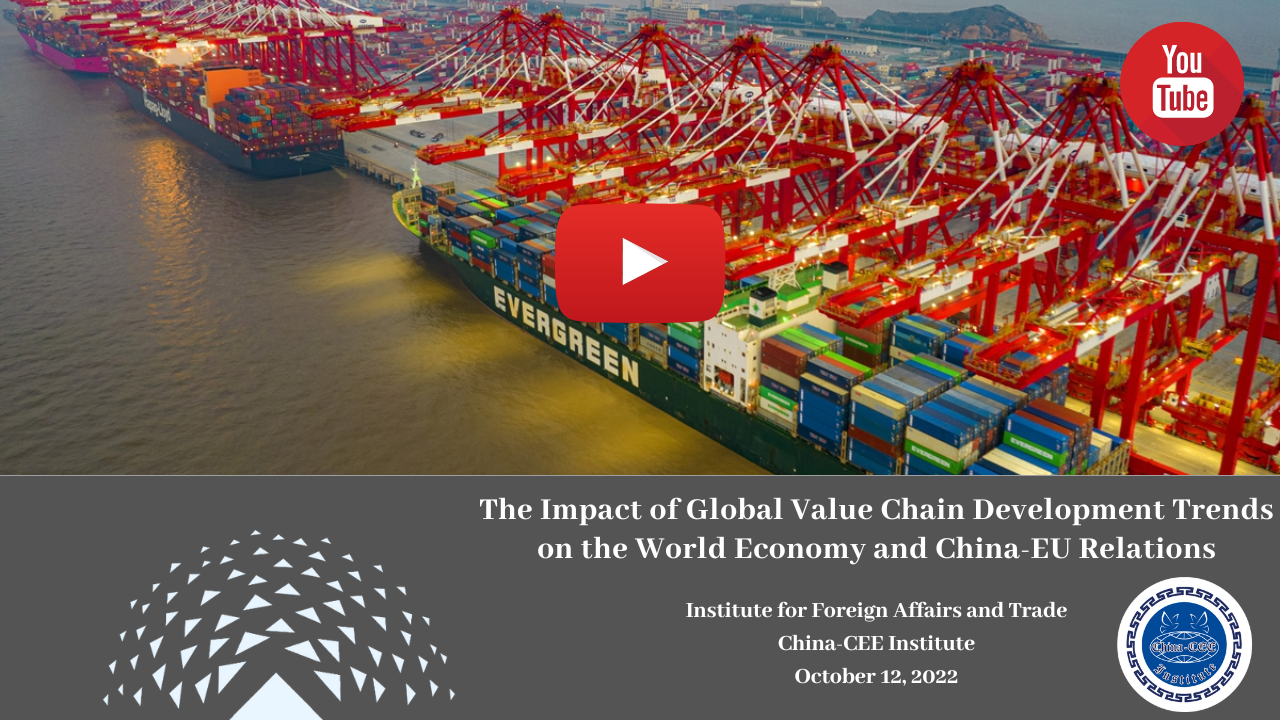On October 12, 2022, the Institute for Foreign Affairs and Trade (IFAT) and the China-CEE Institute organized a joint online event titled “The Impact of Global Value Chain Development Trends on the World Economy and China-EU Relations.” Ambassador Márton Schőberl, Director of IFAT, and Zhongping Feng, Vice President of the China-CEE Institute and Director of the Institute of European Studies of the Chinese Academy of Social Sciences (CASS) opened the conference. In his keynote speech, Ambassador Schőberl elaborated on the fact that the workshops are being organized more and more frequently, which is a great success and a remarkable sign of cooperation between the two institutes, especially in times of increasing tensions. He also highlighted the practical and academic importance of the following topics and stressed the importance of identifying global trends in the value chain, as they are crucial in bilateral and multilateral trade relations for both Europe and China. Director Feng noted that discussions about the future of Europe and the impact of the Russia-Ukraine conflict have increased in Beijing. According to Director Feng, Europe is currently facing many challenges, and a stable global economy can only be achieved if China-Europe relations stabilize.
The moderator of the first panel was Yanhong Sun, a senior researcher at the Institute of European Studies, CASS. The first speaker was Professor Yibin Ding from Jilin College, School of Economics, who presented the topic “Reconstruction of Global Value Chains and Its Impact on China-EU Export Trade”. He pointed out how the growing number of uncertainties in the world economy negatively affects global value chains and ultimately leads to their reconstruction. The cooperation index in GVC specialization between Europe and China has increased in recent years, especially as tensions with the US escalated. This has a positive impact on the commodity structure of Chinese exports to Europe, and he concluded that this cooperation in GVC specialization will certainly continue. The next speaker was Fabrizio Zucca, Professor at Bocconi Business School, Research Center for Regional Economy, Transport and Tourism, President of Strategia & Sviluppo Consultants, and permanent member of the Scientific Committee of EURISPES. In his speech, Mr. Zucca presented some important developments regarding the corporate sustainability standards already introduced by the European Union and the concept of sustainability in the supply chain, which could have a strong impact on trade and trade partnerships. Ties Dams, Research Fellow at the Netherlands Institute of International Relations Clingendael, outlined the difficult situation in which Dutch pension funds and large Western European institutional investors currently find themselves. He argued that these financial players face a major dilemma, as disinvestment in China reduces geopolitical risks but threatens their profit interests. The final speaker of the first panel discussion was Professor Bin Ye, Senior Researcher at the Institute of European Studies, CASS, who spoke about how the EU is creating a “toolbox” of various legal instruments and reviews to push China out of its supply chains. In his view, the new legislation will exacerbate the security concerns of the geopolitically and ideologically contaminated deglobalization sentiment.
The second panel was moderated by Viktor Eszterhai, Senior Research Fellow at IFAT. Changyuan Luo, a Professor at the Institute of World Economics, Fudan University, opened the discussion with the topic of “Political Relations in the Era of Global Value Chain”. In his presentation, he compared the trade relationship between South Korea, which has a close supply chain relationship with China, with the trade relationship between China and Australia, which is characterized by primary and manufactured goods rather than a close supply chain relationship. He concluded that the more symmetrical the supply chain dependence of the two countries, the more they participate in the global supply chain, and the more complementary their positions in the global supply chain, the stronger the positive effects of supply chain relationships on international relations. Goreczky Péter, senior analyst and manager of the Asia-Pacific Research Program at IFAT, focused on the main factors behind recent supply chain disruptions in the global economy and the potential impact of these disruptions on EU-China trade relations. The following speaker, Qingyi Su, Senior Researcher at the Institute of World Economics and Politics at CASS, talked about the causes of global supply chain disruptions, as well as the short- and long-term impacts of these disruptions, and made some suggestions for improving EU-China economic cooperation. These include establishing a comprehensive supply chain coordination mechanism, launching joint initiatives on export restrictions, and finally enhancing bilateral supply chain cooperation. Paula Toma, a research fellow at the Institute of Political Science and International Relations “Ion.C.Brătianu,” presented her latest research on the cooperation between China and the countries of CEE and also addressed the sanctions imposed by the EU in response to China’s growing economic influence in the region. She addressed how the Covid-19 pandemic drove China and CEE even further apart, as well as the sudden conflict with Lithuania over Taiwan. Ms. Toma stressed the need for dialogue as China continues to rely on the European consumer market and the EU relies on China politically and economically in many ways.
In the closing session, Tamás Péter Baranyi, Deputy Director for Strategy at IFAT, briefly summarised the results of the seminar and emphasized the importance of the discussion. Finally, Xin Chen, Deputy Director at the Institute of European Studies, CASS, and executive chairman of the China-CEE Institute, shared his thoughts on the issues and problems related to global supply chains.
For the full recording please click on the link below or visit our YouTube-channel!
JTNDaWZyYW1lJTIwd2lkdGglM0QlMjIxMDAlMjUlMjIlMjBoZWlnaHQlM0QlMjI0NTAlMjIlMjBzcmMlM0QlMjJodHRwcyUzQSUyRiUyRnd3dy55b3V0dWJlLmNvbSUyRmVtYmVkJTJGQ20wTW5tLWlSZE0lMjIlMjB0aXRsZSUzRCUyMllvdVR1YmUlMjB2aWRlbyUyMHBsYXllciUyMiUyMGZyYW1lYm9yZGVyJTNEJTIyMCUyMiUyMGFsbG93JTNEJTIyYWNjZWxlcm9tZXRlciUzQiUyMGF1dG9wbGF5JTNCJTIwY2xpcGJvYXJkLXdyaXRlJTNCJTIwZW5jcnlwdGVkLW1lZGlhJTNCJTIwZ3lyb3Njb3BlJTNCJTIwcGljdHVyZS1pbi1waWN0dXJlJTIyJTIwYWxsb3dmdWxsc2NyZWVuJTNFJTNDJTJGaWZyYW1lJTNF

